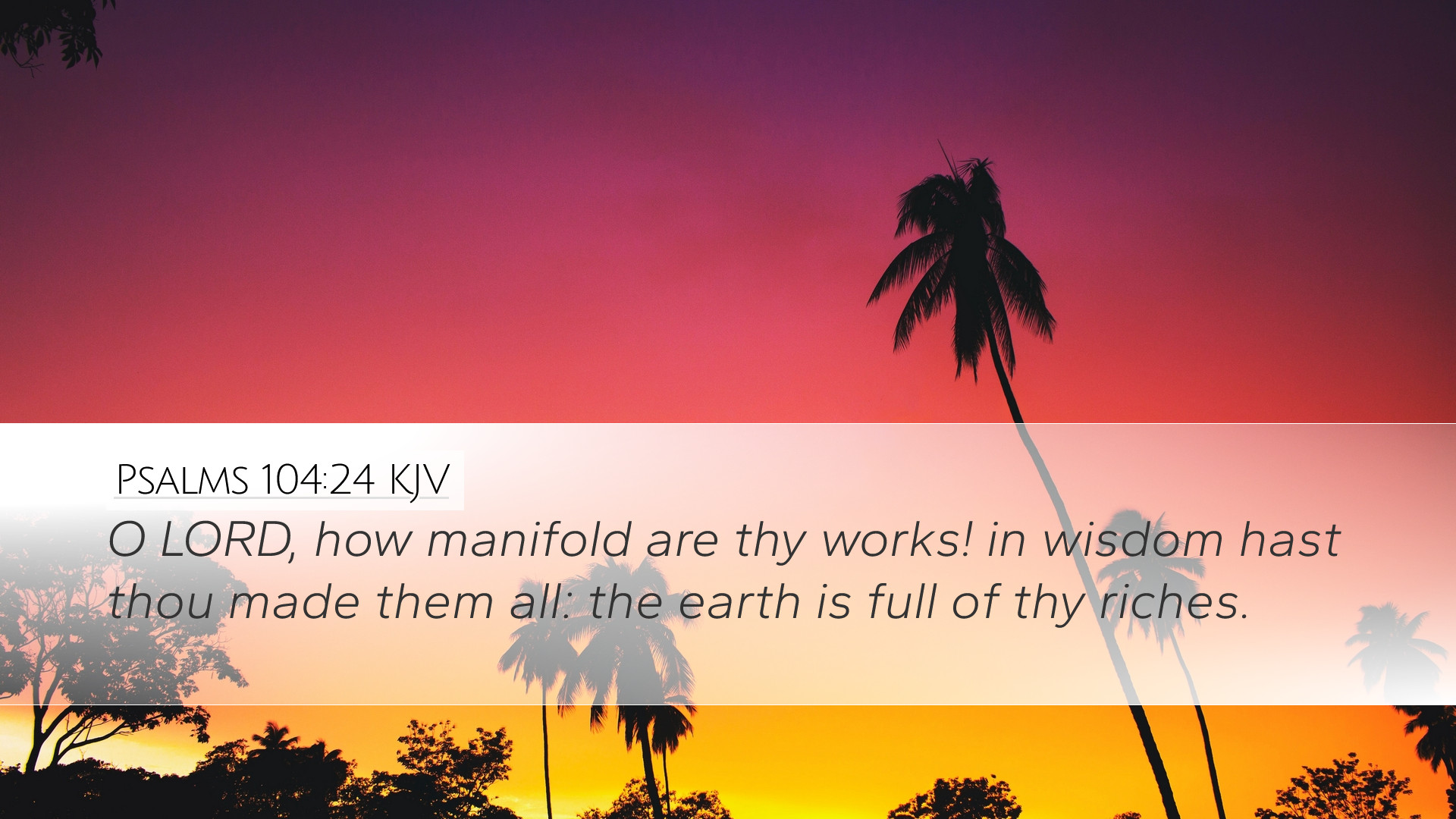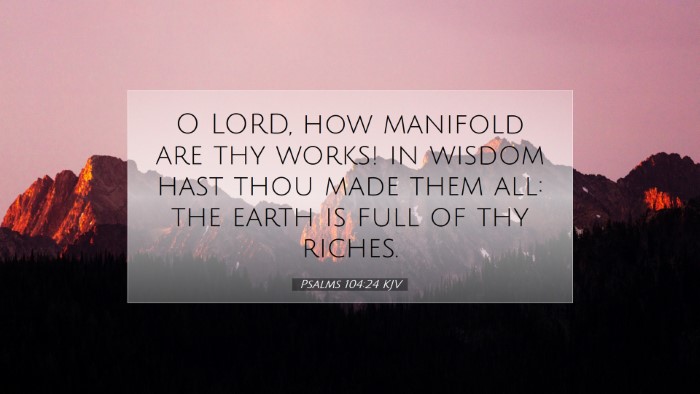Commentary on Psalms 104:24
Bible Verse: Psalms 104:24 - "O Lord, how manifold are thy works! In wisdom hast thou made them all: the earth is full of thy riches."
Introduction
This verse from the Book of Psalms articulates a profound truth about the nature of God and His creation. The psalmist expresses awe at the diversity and vastness of God's works, highlighting His wisdom in creation. This commentary seeks to explore the theological implications, historical context, and practical applications of this verse, drawing from the insights of renowned public domain commentaries.
The Nature of God's Works
The verse opens with a declaration of the manifold works of the Lord. According to Matthew Henry, this phrase signifies the vast and diverse creations of God that encompass the entirety of the universe. Henry emphasizes that God's works are not only numerous but also exhibit a remarkable variety, showcasing His boundless creativity.
Albert Barnes comments on the term "manifold," interpreting it as an expression of God's infinite creativity and artistry. He notes that every creature, every natural phenomenon, and every element of the earth displays the glory of God’s handiwork. This diversity prompts a sense of wonder and contemplation regarding the Creator.
God's Wisdom in Creation
The verse continues by proclaiming, "In wisdom hast thou made them all." Here, the psalmist acknowledges the wisdom of God in His creative acts. Adam Clarke elaborates on this by asserting that the intricate design found in nature is a testament to God's wisdom. The laws of nature, the balance in ecosystems, and the intricate relationships among creatures are all evidence of divine intelligence and purpose.
- Nature’s Complexity: According to Clarke, the complexity of nature, from the smallest organism to the grandest celestial bodies, unveils the mind of God, who orchestrates it all with skill and forethought.
- Human Understanding: Barnes further comments that human beings, though capable of great intellect, can only begin to grasp the vast wisdom reflected in creation. This humility encourages reverence towards God.
The Earth's Riches
The latter part of the verse states, "the earth is full of thy riches." This assertion reflects not only the physical abundance of the earth but also its spiritual significance. Matthew Henry interprets the "riches" of the earth as both material provisions for humanity and the bounty of spiritual blessings that God bestows upon His creation.
Albert Barnes notes that these riches include "the variety of fruits, flowers, and all the resources necessary for life," which point to God’s provision for His creation. He emphasizes that recognizing this fullness leads to gratitude and stewardship.
Gratitude and Stewardship
The acknowledgment of God’s works leads to two significant responses: gratitude and stewardship. As Clarke suggests, recognizing the richness of the earth should inspire believers to cultivate an attitude of thankfulness for God's generosity. This gratitude can transform the believer's relationship with creation and with God Himself.
- Gratitude: The realization of God's manifold works fosters a spirit of worship and thankfulness among believers. Reflecting on creation's beauty and complexity should lead to praise for the Creator.
- Stewardship: Understanding that the earth is filled with God's riches implies a responsibility to care for it. Barnes asserts that as stewards of God's creation, human beings must exercise wise and respectful management of the earth's resources.
Theological Implications
This verse encapsulates important theological truths about God’s nature—specifically His creativity, wisdom, and generosity. The diverse manifestations of God's work serve as a reminder of His omnipotence and providence. According to Matthew Henry, contemplating God’s works encourages believers to trust in His plans and purposes.
Adam Clarke reminds us that this verse invites believers to reflect on their own existence within the framework of God’s grand design. It challenges the faithful to consider their part in this creation and to live in a manner that honors the Creator.
Implications for Daily Living
For pastors and theologians, this verse serves as a profound reminder of the importance of presenting the creation story within the Gospel narrative. The beauty and complexity of God’s creation can be a powerful tool for evangelism and teaching.
- In Worship: Incorporating themes of creation and gratitude into worship can deepen congregational appreciation for God's works.
- In Teaching: Educators should emphasize stewardship in theological teachings, helping students understand their role in caring for God's creation.
Conclusion
Psalms 104:24 invites believers to marvel at the manifold works of the Lord, recognizing the wisdom behind creation and the richness of the earth. Through reflections on this verse, we are compelled to respond with gratitude and a sense of stewardship towards creation. As we deepen our understanding of this scripture, let it transform our worship, teachings, and daily lives in honor of the Creator who has wondrously made all things.
As we engage with this text, may we echo the psalmist’s sentiments, continually seeking to comprehend and celebrate the diversity and depth of God's creative power.


